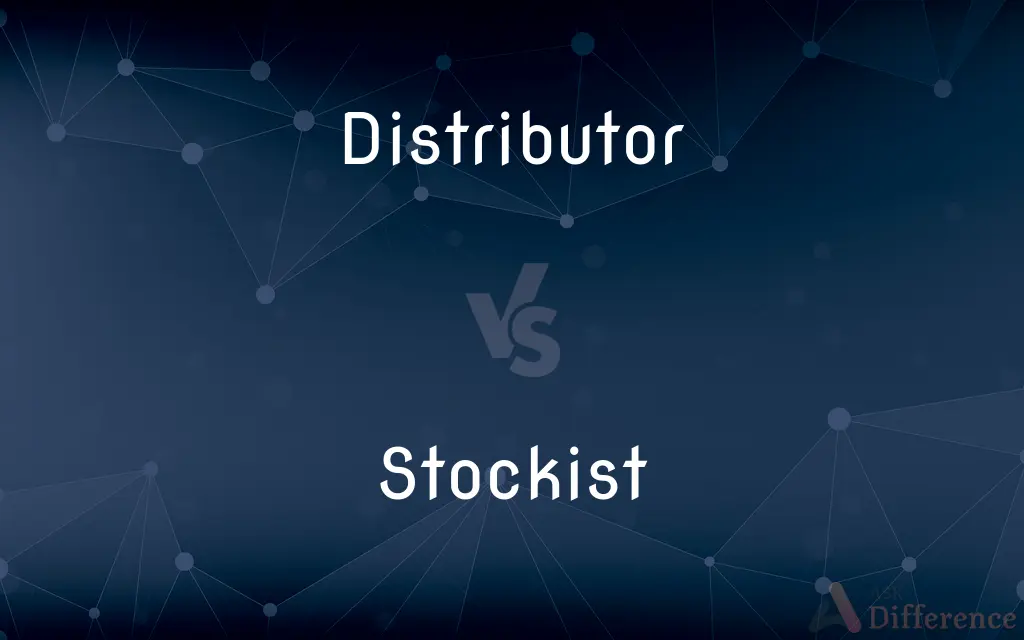Distributor vs. Stockist — What's the Difference?
By Tayyaba Rehman — Updated on September 21, 2023
A distributor is an entity that buys products and sells them to retailers or end-users, while a stockist is an entity that holds or stocks products for resale, often supplied by a distributor.

Difference Between Distributor and Stockist
Table of Contents
ADVERTISEMENT
Key Differences
The business landscape is vast, and terms like distributor and stockist often come into play. A distributor is primarily an intermediary, bridging manufacturers and end users or retailers. Their role entails buying products in bulk and distributing them in smaller quantities. A stockist, conversely, is more about storage. They hold or "stock" inventory for resale.
This means a distributor often handles a range of logistical tasks, ensuring products move seamlessly from producers to the market. The stockist, on the other hand, might focus more on maintaining inventory levels, ensuring they always have items ready for immediate sale or distribution.
In some contexts, these terms may overlap, as a company can act as both a distributor and stockist. Nevertheless, while both are essential cogs in the supply chain, a distributor's emphasis is on the flow of goods, whereas a stockist emphasizes storage and inventory management.
Comparison Chart
Primary Role
Acts as an intermediary between manufacturers and market.
Holds or stocks inventory for resale.
Focus
Distribution and logistics.
Storage and inventory management.
ADVERTISEMENT
Quantity
Buys in bulk and sells in smaller quantities.
Maintains optimal inventory levels for resale.
Relationship
Direct ties with manufacturers and retailers/end-users.
Often sourced from distributors or wholesalers.
Range
Might handle a variety of products from multiple sources.
Typically stocks specific products in depth.
Compare with Definitions
Distributor
An organization facilitating product flow.
The distributor played a crucial role in the product's market penetration.
Stockist
A business maintaining optimal inventory levels.
The renowned stockist never ran out of essential supplies.
Distributor
A middleman handling product logistics.
The new distributor streamlined the supply chain effectively.
Stockist
An entity holding inventory for resale.
The local stockist always had the latest shoe models.
Distributor
A firm buying in bulk and redistributing.
Large retailers often purchase goods directly from the distributor.
Stockist
A firm focusing on storage and immediate sales.
The stockist quickly provided retailers with the demanded quantities.
Distributor
A distributor, also commonly known as a dizzy, is an enclosed rotating shaft used in spark-ignition internal combustion engines that have mechanically timed ignition. The distributor's main function is to route secondary, or high voltage, current from the ignition coil to the spark plugs in the correct firing order, and for the correct amount of time.
Stockist
A reseller with specific product stocks.
As an exclusive stockist, they had a competitive edge.
Distributor
An agent who supplies goods to retailers
A sports goods distributor
Stockist
A retailer or wholesaler with ample product storage.
The pharmacy was a known stockist of rare medicinal drugs.
Distributor
A device in a petrol engine for passing electric current to each spark plug in turn.
Stockist
A commercial retailer or wholesaler that stocks merchandise.
Distributor
One that distributes, especially a device that applies electric current in proper sequence to the spark plugs of an engine.
Stockist
A retailer or distributor who has stocks of a certain type of item for sale.
I need a replacement cartridge but I can't find a stockist.
Distributor
One that markets or sells merchandise, especially a wholesaler.
Stockist
One (as a retailer or distributor) that stocks goods
Distributor
One who or that which distributes.
Distributor
A device that distributes electric current, especially to the spark plugs in an internal combustion engine.
Distributor
A machine for distributing type.
Distributor
An appliance, such as a roller, in a printing press, for distributing ink.
Distributor
One that distributes; a distributer;
Distributor
Someone who markets merchandise
Distributor
A person with authority to allot or deal out or apportion
Distributor
A company that markets merchandise;
His company is a large distributor of software products
Distributor
Electrical device that distributes voltage to the spark plugs of a gasoline engine in the order of the firing sequence
Distributor
An entity bridging manufacturers and retailers.
The distributor ensured timely delivery of electronics to local stores.
Distributor
An agent ensuring goods reach the end-user.
The company sought a reliable distributor for its latest product line.
Common Curiosities
Do distributors have direct ties with manufacturers?
Yes, distributors often have direct relationships with manufacturers to buy products in bulk.
How does a stockist operate?
A stockist holds or stocks products for resale, maintaining optimal inventory levels.
What does a distributor do?
A distributor acts as an intermediary, buying products in bulk and selling them to retailers or end-users.
Why might a manufacturer choose a distributor?
A manufacturer might use a distributor for their expertise in logistics, market reach, and relationships with retailers.
Is a stockist the same as a retailer?
Not always. While a stockist can be a retailer, they can also be wholesalers holding inventory for other businesses.
Can a company be both a distributor and stockist?
Yes, a company can function as both a distributor and stockist, handling distribution and maintaining inventory.
Can a distributor influence product pricing?
Yes, distributors can influence product pricing based on factors like logistics costs and market demand.
Do distributors carry products from multiple manufacturers?
Yes, many distributors handle a variety of products from multiple manufacturers.
What's the key difference between distributor and stockist?
While both play roles in the supply chain, a distributor focuses on product flow and logistics, whereas a stockist emphasizes storage and inventory.
Do stockists deal directly with manufacturers?
Stockists can deal directly with manufacturers, but often they source products from distributors or wholesalers.
How do stockists ensure they don’t run out of products?
Stockists maintain optimal inventory levels and often have robust replenishment systems.
Are stockists exclusive to specific products?
Some stockists might exclusively hold certain products, offering depth in that inventory, while others have a broader range.
How do stockists benefit manufacturers?
Stockists ensure that products are readily available for immediate sale, offering manufacturers a steady sales outlet.
Why are distributors essential in the supply chain?
Distributors streamline the flow of goods, making products accessible to a broader market efficiently.
Can distributors offer feedback on products?
Yes, since distributors have insights into market demands, they can provide valuable feedback to manufacturers.
Share Your Discovery

Previous Comparison
Jeans vs. Jeggings
Next Comparison
Area vs. PerimeterAuthor Spotlight
Written by
Tayyaba RehmanTayyaba Rehman is a distinguished writer, currently serving as a primary contributor to askdifference.com. As a researcher in semantics and etymology, Tayyaba's passion for the complexity of languages and their distinctions has found a perfect home on the platform. Tayyaba delves into the intricacies of language, distinguishing between commonly confused words and phrases, thereby providing clarity for readers worldwide.














































